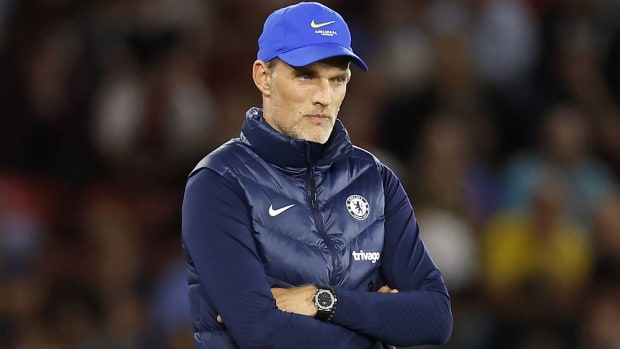After a summer spree in which it outspent everyone, Chelsea and its new ownership have acted swiftly in reaction to a subpar start to the season.
So much for a new way of doing things at Chelsea. After the regular churn of managers under Roman Abramovich, the message had been of continuity and patience at Chelsea after the Clearlake Capital takeover headed by Todd Boehly. The consortium aspired, it was said, to be a Liverpool of the south, spending wisely on a plan conceived in partnership with the manager, Thomas Tuchel. Yet just 33 days into the season, in the wake of Tuesday’s 1–0 defeat at Dinamo Zagreb to open the Champions League group stage, Tuchel has been sacked. Abramovich’s earliest firing was that of José Mourinho, 39 days into 2007–08.
It’s been a long time since a Chelsea manager had been given as much say over signings as Tuchel was, and that creates an obvious problem for his successor. This is a Tuchel-shaped squad, nearly $300 million pumped into it this summer. It was Tuchel who wanted to get rid of Romelu Lukaku, who was loaned out to Inter. It was Tuchel who wanted Raheem Sterling. It was Tuchel who advocated for a reunion with Pierre-Emerick Aubameyang and Tuchel who wanted Wesley Fofana. It was Tuchel whose skepticism about Jules Koundé led to the signing of Kalidou Koulibaly instead. And it was Tuchel who, repeatedly, vetoed the signing of Cristiano Ronaldo.
Yet Tuchel, who handled himself with such grace in the wake of the sanctioning of Abramovich, aware both of the difficulty of his situation but also of the relative unimportance of Chelsea against the wider backdrop of Russia’s invasion of Ukraine, has seemed notably downbeat since the end of last season.

Steven Paston/PA Images/Imago Images
With director Marina Granovskaia and technical advisor Petr Cech having departed after Boehly’s arrival, there was little football expertise left at the club, and Tuchel perhaps felt the pressure of having to manage all of that, particularly given the need to replace Antonio Rüdiger and Andreas Christensen and add a new forward to take Lukaku’s place in the squad.
Certainly Boehly has not suggested any deep understanding, with his repeated advocacy of Ronaldo reportedly frustrating Tuchel, with whom he was in daily contact. Boehly, meanwhile, apparently struggling with the role of sporting director in a world in which he had no experience, is said to have felt Tuchel could have been clearer in explaining his thinking and could have done more to help land transfers—something that was particularly apparent in the failure to land Raphinha and, to a lesser extent, the disagreement over Koundé. The oddity is that Tuchel’s one real achievement with Chelsea, winning the Champions League in 2021, came with a squad he had inherited rather than having had any role in shaping.
But this is not just about disputes over signings, or issues between Tuchel and Boehly. The performances away to Leeds and Southampton were surprisingly flat and led to defeats. Only in the first half against Tottenham was there any real sense of Tuchel rediscovering the heights of the first half of last season—and even that game ended up in a draw. The display in Zagreb, meanwhile, for all that Chelsea was probably a little unfortunate, was dismal. “Everything is missing,” Tuchel said afterward. The suggestion, though, is that the decision to sack him had been taken before that. As ever in such circumstances, there have been rumors about players finding Tuchel’s intensity wearing.
Two early favorites have emerged to replace him: Graham Potter of Brighton and Mauricio Pochettino, who is without a club having left Paris Saint-Germain in the summer. Potter has been hugely impressive as manager of Brighton, which currently sits fourth in the table despite an extremely limited budget. His football is neat and intelligent and features regular changes of shape. There’s not a huge amount more a manager could do to impress at a club of that stature, but it’s hard to think of many clubs more different than Chelsea and Brighton, in terms of squad, backroom support and expectation. At Brighton he had complete buy-in from players who had largely been bought to his specifications; that would not be the case at Chelsea.
Pochettino, meanwhile, has high-level Premier League experience with Tottenham, a club he led to a Champions League final. He, too, favors a pragmatic, high-pressing style, and has more experience dealing with big egos.
But whoever takes over will have to handle a squad built for somebody else. That, though, is perhaps the less significant issue; more relevant is that Chelsea is a club whose owners have no football experience and have just sacked a man who helped them spend $300 million on players. This has not been a summer from Chelsea to inspire much confidence in the new leadership.
More Soccer Coverage: